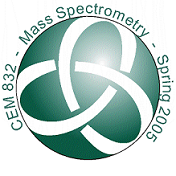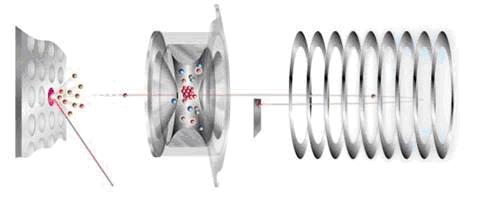|
|
CEM 832 - Mass
Spectrometry - Spring 2014 |
|
Other
recommended Texts: De Hoffmann, E. and Stroobant, V.
"Mass Spectrometry: Principles and Applications", 3rd
Edition, Other
course material will be given in handout form throughout the semester. ________________________________________________________________________ Course
Outline: Development of an advanced
understanding of the underlying principles of modern analytical mass
spectrometry instrumentation and methods applied to the structural elucidation
of biological molecules. Prerequisites: It is
assumed that students have prior general knowledge of mass spectrometry,
equivalent to that covered in the mass spectrometry module of CEM 835, and in
Chapter 11 and Chapter 20 of Skoog, Holler and Crouch,
Principles of Instrumental Analysis, 6th Edition, Thomson
Brooks/Cole Publishers, 2007. Scheduled Class Times:
Tuesday and Thursday - 12.40pm - 2.00pm Room: 183 Chemistry Instructor: Associate Professor Gavin E. Reid Instructor Office hours: Room 229
Chemistry, Tuesday – 11.30am - 12.30pm, or by appointment
Homework
/ Other Assignments / Class presentations: – 35% Final
Exam (comprehensive): Wednesday April 30th, 12.45 – 2.45pm – 40% Grading
Scale: The scale indicated
below is based on the number of total points accrued being converted to a
percentage of the total points available. These grade cut-offs may be relaxed
by a small amount, at the instructor’s discretion. In no event shall the
grade levels be made more stringent than indicated below.
Homework: Homework assignments must be handed in by
the end of class on the due date. Unless other arrangements have been made in
advance with the instructor, a 15% grade reduction will be given for
each day that your homework is not handed in after the due date, up to a
maximum of 3 days. After that time, a grade of 0 will be given. Lecture
Schedule: Jan 7 – Jan 23 General
Principles, Vacuum Systems, Sample Introduction,
Detection Methods, Introduction/Overview
of Ionization Methods Jan 28 – Feb 6 Group
Presentations Research/Preparation (no class) Feb 11 and Feb 13 Group
Presentations Feb 13 – Mar 11 Mass Analyzers (Note: Feb 27 - no class, Mar 4
and 6 (Spring Break) - no class) Mar 13 Midterm
Exam (in class) Mar 18 – Mar 25 Tandem Mass Spectrometry Mar 27 – Apr 1 Odd
Electron Gas-Phase Fragmentation
Reactions Apr 3 – Apr 10 Individual
Presentations Research/Preparation (no class) Apr 15 – Apr 17 Even
Electron Gas-Phase Fragmentation
Reactions Apr 22 – Apr 24 Individual
Presentations– Literature Apr 30 Final Exam Religious
Observances / Other Absences from Class: It
is the responsibility
of students who plan to be absent from class at certain times throughout the
semester, due to religious holidays or other reasons, to make arrangements in
advance with the instructor. Course notes or handouts may be obtained
from the instructor if these conditions are met. If a make-up exam is
required, the instructor retains the right to determine the content of the
exam and the conditions of administration, giving due consideration to
equitable treatment. Academic Honesty: Academic dishonesty at Cheating -
Providing or accepting assistance with
completing assignments or examinations, without proper authorization. Plagiarism -
Supplying or using work or answers that are not one's own,
without proper citation. Fabrication-
Faking data or results. Sabotage- Interfering through any means with
another's academic work. Deception-
Providing false information - e.g., giving a
false excuse for missing a deadline or falsely claiming to have submitted
work. Students share with the faculty a
responsibility for maintaining the integrity of scholarship, grades, and
professional standards. CEM 835 adheres to the policies on academic honesty
specified in General Student Regulation 1.0, Protection of Scholarship and
Grades; the all-University Policy on Integrity of Scholarship and
Grades; and Ordinance 17.00, Examinations. (See Spartan Life: Student
Handbook and Resource Guide and/or the MSU Web site www.msu.edu.) Unless authorized by your
instructor, you are expected to complete all course assignments, including
homework, lab work, quizzes, tests and exams, without assistance from any
source. You are expected to develop original work for this course; therefore,
you may not submit course work you completed for another course to satisfy
the requirements for this course. Also, you are not authorized to use
the www.allmsu.com Web site or similar web sites to complete any course work
in this course. Students
who violate these rules will be assigned a failing grade for the course. |
|||||||||||||||||||
|
|
|
|
This page maintained by Gavin
Reid. Last Updated: July 8th, 2013 |

